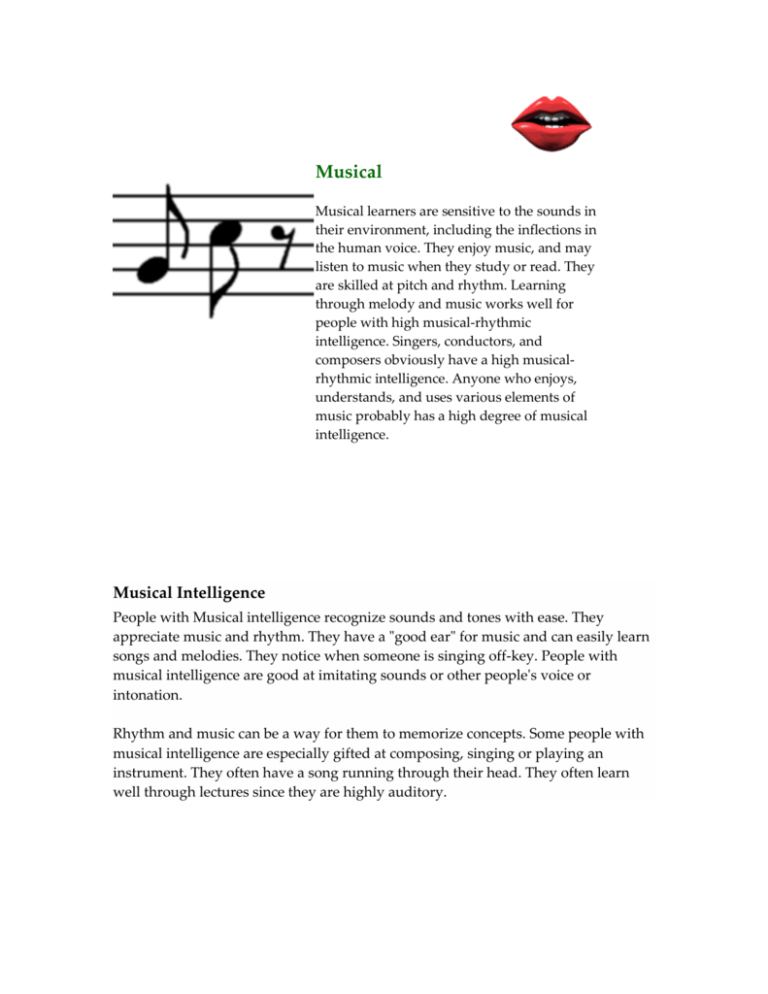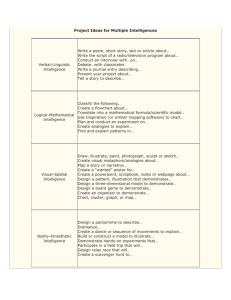Musical - Start.ca
advertisement

Musical Musical learners are sensitive to the sounds in their environment, including the inflections in the human voice. They enjoy music, and may listen to music when they study or read. They are skilled at pitch and rhythm. Learning through melody and music works well for people with high musical-rhythmic intelligence. Singers, conductors, and composers obviously have a high musicalrhythmic intelligence. Anyone who enjoys, understands, and uses various elements of music probably has a high degree of musical intelligence. Musical Intelligence People with Musical intelligence recognize sounds and tones with ease. They appreciate music and rhythm. They have a "good ear" for music and can easily learn songs and melodies. They notice when someone is singing off-key. People with musical intelligence are good at imitating sounds or other people's voice or intonation. Rhythm and music can be a way for them to memorize concepts. Some people with musical intelligence are especially gifted at composing, singing or playing an instrument. They often have a song running through their head. They often learn well through lectures since they are highly auditory. Linguistic Verbal-linguistic learners have highly developed auditory skills, enjoy reading and writing, like to play word games, and have a good memory for names, dates, and places. They like to tell stories, and get their point across. You learn best by saying and hearing words. Poets, writers, and people who speak a great deal in their jobs (like teachers) probably have a high degree of verbal-linguistic intelligence. People with Linguistic intelligence love words. They enjoy reading and writing. Linguistic people are often gifted at learning languages. They appreciate the complexities of sentence structure, word structure, meaning and sound. They savor convoluted words and are quick at learning them. They possess rich vocabularies. School is an area in which people with Linguistic intelligence often do well. They enjoy lectures and taking notes. They also have the ability to teach others and communicate complex concepts. People with Linguistic intelligence are adept at communicating through the written word and seek to hone their skills. Logical-Mathematical Logical-mathematical intelligence is often linked with the term "scientific thinking." Logical-mathematical people like to explore patterns and relationships, like to experiment with things you don't understand, ask questions, and enjoy well-ordered tasks. They like to work with numbers and relish opportunities to solve problems via logical reasoning. They learn best by classifying information, using abstract thought, and looking for common basic principles and patterns. Many scientists have a high degree of logicalmathematical intelligence. Logical-Mathematical Intelligence People with Logical intelligence process information through logic and reason. They are attracted to investigation by means of the scientific method. They do well with quantitative methods that rely on the researcher's ability to observe and reach a verifiable conclusion. They dislike nebulous assumptions and subjective analysis. Instead, they trust hard facts and numerical data. They seek accuracy and precision in their learning and work. Their mind is complex and works like a computer. Logical Intelligence thrives on mathematical models, measurements, abstractions and complex calculations. Spatial Spatial people work well maps, charts, diagrams, and visual arts in general. They are able to visualize clear mental images. They like to design and create things. They learn best by looking at pictures and watching videos. Sculptors, painters, architects, surgeons, and engineers are a few professions that require people with well-developed spatial abilities. Visual-Spatial Intelligence People with Visual/Spatial intelligence are very aware of their surroundings and are good at remembering images. They have a keen sense of direction and often enjoy maps. They have a sharp sense of space, distance and measurement. People with Visual intelligence learn well through visual aids such as graphs, diagrams, pictures and colorful displays. They usually enjoy visual arts such as drawing, painting and photography. They can visualize anything related to art, fashion, decoration and culinary design before creating it. Kinesthetic Kinesthetic learners use bodily sensations to gather information. They have good balance and coordination and are good with their hands. Learning activities that provide physical activities and hands-on learning experiences work well for them. People with highly developed kinesthetic abilities include carpenters, mechanics, dancers, gymnasts, swimmers, and jugglers. Bodily/Kinesthetic Intelligence People with Kinesthetic intelligence learn through movement and experimentation. They enjoy sports and activities that require physical exertion and mastery. Some Kinesthetic people enjoy the artistic side of movement such as dance or any kind of creative movement. These artistic types enjoy acting and performing in front of an audience. People with Kinesthetic intelligence enjoy building things and figuring out how things work. They like to use their hands and are very active. They have excellent motor skills and coordination. They are very physical and are keenly aware of their bodies. Intrapersonal Intrapersonal learners are aware of their own strengths, weaknesses, and feelings. They are aware of self, being a creative and independent, and reflective thinker. They usually possess independence, self-confidence, determination, and high motivation. They may respond with strong opinions when controversial topics are discussed. They learn best by engaging in independent study projects rather than working on group projects. Pacing their own instruction is important to them. Entrepreneurs, philosophers, and psychologists are a few professions where strong intrapersonal skills are a benefit. Intrapersonal Intelligence People with Intrapersonal intelligence are adept at looking inward and figuring out their own feelings, motivations and goals. They are quintessentially introspective. They analyze themselves and seek understanding. People with intrapersonal intelligence are intuitive and usually introverted. They learn independently and through reflection. Philosophy, psychology and theology are often of interest to people with intrapersonal intelligence. They enjoy journaling because it helps them learn about themselves. They are also good at helping others understand themselves. They are able to predict the reactions of themselves and others. Interpersonal Interpersonal learners are "people-persons." They enjoy being around people, like talking to people, have many friends, and engage in social activities. They can develop genuine empathy for the feelings of others. They learn best by relating, sharing, and participating in cooperative group environments. The best salespeople, consultants, community organizers, counselors, and teachers have a high interpersonal intelligence. Interpersonal Intelligence People with Interpersonal intelligence thrive with social interaction. They are gifted at establishing rapport with strangers and make friends easily. They are adept at reading, empathizing and understanding others. People with Interpersonal intelligence work well with others and often have many friends. They are masters at collaboration. Interaction, dialogue and lively discussions are ways in which people with Interpersonal intelligence learn. They are enthusiastic and lively. Others often seek them out for advice, help and comfort. They are good at making others feel welcome and often reach out to outsiders. They are inclusive of others. The more the merrier.







